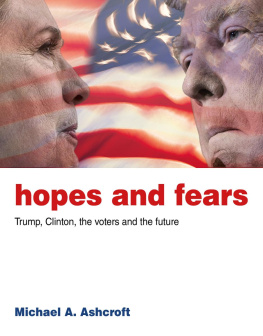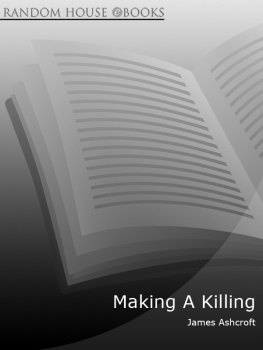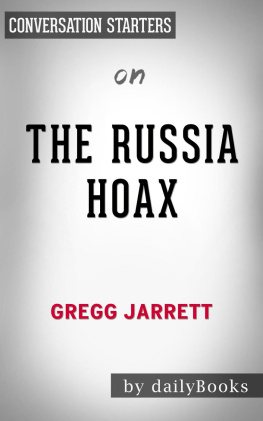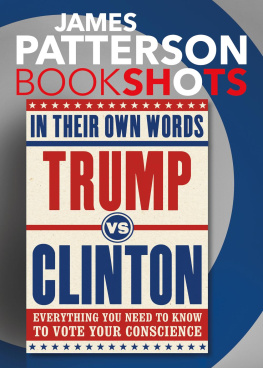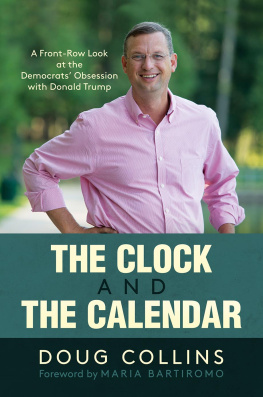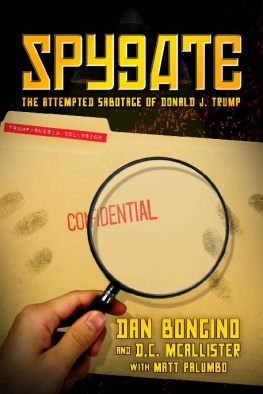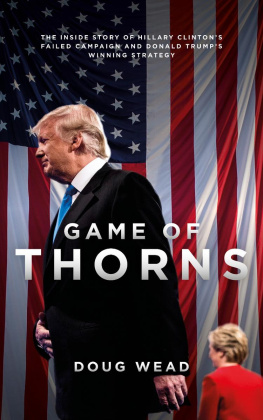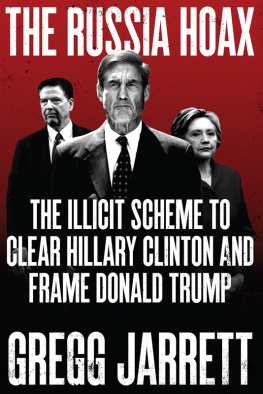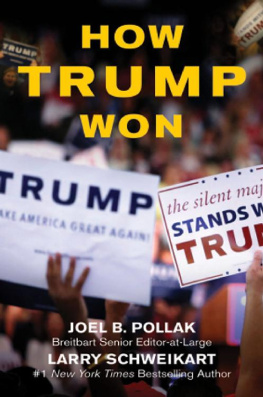Ashcroft - Hopes and Fears: Trump, Clinton, the voters and the future
Here you can read online Ashcroft - Hopes and Fears: Trump, Clinton, the voters and the future full text of the book (entire story) in english for free. Download pdf and epub, get meaning, cover and reviews about this ebook. City: La Vergne;United States, year: 2017, publisher: Biteback Publishing, genre: Politics. Description of the work, (preface) as well as reviews are available. Best literature library LitArk.com created for fans of good reading and offers a wide selection of genres:
Romance novel
Science fiction
Adventure
Detective
Science
History
Home and family
Prose
Art
Politics
Computer
Non-fiction
Religion
Business
Children
Humor
Choose a favorite category and find really read worthwhile books. Enjoy immersion in the world of imagination, feel the emotions of the characters or learn something new for yourself, make an fascinating discovery.
Hopes and Fears: Trump, Clinton, the voters and the future: summary, description and annotation
We offer to read an annotation, description, summary or preface (depends on what the author of the book "Hopes and Fears: Trump, Clinton, the voters and the future" wrote himself). If you haven't found the necessary information about the book — write in the comments, we will try to find it.
Ashcroft: author's other books
Who wrote Hopes and Fears: Trump, Clinton, the voters and the future? Find out the surname, the name of the author of the book and a list of all author's works by series.
Hopes and Fears: Trump, Clinton, the voters and the future — read online for free the complete book (whole text) full work
Below is the text of the book, divided by pages. System saving the place of the last page read, allows you to conveniently read the book "Hopes and Fears: Trump, Clinton, the voters and the future" online for free, without having to search again every time where you left off. Put a bookmark, and you can go to the page where you finished reading at any time.
Font size:
Interval:
Bookmark:
LORD ASHCROFT KCMG PC is an international businessman, author, philanthropist and pollster. He has many, varied business interests with significant investments and participation in both public and private companies in the United Kingdom, United States and the Caribbean. From 2005 to 2010 he was Deputy Chairman of the Conservative Party in the UK, having earlier been its Treasurer from 1998 to 2001. In September 2012 he was made the UK Governments Special Representative for Veterans Transition, working with all departments to ensure military personnel receive the support they need when making the transition to civilian life.
His political works include Smell The Coffee: A Wake-Up Call For The Conservative Party; Minority Verdict; Pay Me Forty Quid And Ill Tell You: The 2015 Election Through The Eyes Of The Voters; Call Me Dave: The Unauthorised Biography of David Cameron (with Isabel Oakeshott); and Well, You Did Ask: Why The UK Voted To Leave The EU. He is also the author of Dirty Politics, Dirty Times about his battle with New Labour and The Times newspaper.
He is Founder and Chairman of the Board of Crimestoppers, the only UK charity dedicated to solving crimes, a Trustee of the Imperial War Museum, Chairman of the Trustees of Ashcroft Technology Academy in south London, Chancellor of Anglia Ruskin University, Treasurer of the International Democrat Union, a Trustee of the Cleveland Clinic and a Fellow of the Canadian Geographical Society.
Lord Ashcrofts life-long interest in bravery has led to him writing six books on the subject and building the largest collection of Victoria Crosses in the world. This collection is on display in the Lord Ashcroft Gallery at Imperial War Museum, London. The author royalties from each of his books on gallantry have been donated to military charities.
As part of his commitment to philanthropy, Lord Ashcroft has donated tens of millions of pounds to good causes in the UK and abroad. He has also signed up to The Giving Pledge, a commitment by the worlds wealthiest individuals and families to dedicate the majority of their wealth to philanthropy.
His political research and commentary is published at LordAshcroftPolls.com. For more information about Lord Ashcroft visit LordAshcroft.com. You can also follow him on Twitter: @LordAshcroft.
the wisdom of the people
FOR THOSE OF US WHO HAD STAYED UP to watch the results trickle in from Britains referendum on the European Union, there was something eerily familiar about the night of 8 November, 2016. For the second time in a year, the people had delivered a verdict that would surprise and horrify many in the political world and beyond.
For the previous two months, the Lord Ashcroft Polls team had travelled the United States to listen to the people who would decide whether to put Donald Trump or Hillary Clinton in the White House. In our focus groups, we spoke to partisans and especially undecided voters of all ages and backgrounds in seven swing states which turned out to be critical to the result: Wisconsin, North Carolina, Virginia, Pennsylvania, Arizona, Florida, and Ohio. I wrote week by week about what they had to say indeed listeners to the Ashcroft In America podcast heard first hand, as well as my interviews with eminent participants in and observers of the American political scene such as Mitt Romney, Howard Dean, Rachel Maddow, Karl Rove, Joe Trippi and Jon Sopel.
Since I never make predictions about politics, it would be a bit much to claim now that we had any particular foresight of Donald Trumps victory. In any case, forecasting the result was not the purpose of the project. But looking back at the focus group findings, together with the results of a thirty-thousand sample poll we conducted over the final weeks, we can see how it happened.
I should make clear that I had no dog in this fight. As someone who has conducted political polling in the UK and Europe for over a decade, most recently focusing on the forces at play in the Brexit referendum, I was naturally drawn to such a fascinating contest. I came to observe, listen and learn, and to report what I found.
In this book I have brought together that research with two aims. First, I want to help understand how the result came about, because I think it can be, and in some quarters has been, misunderstood particularly in Britain, where many have not grasped the appeal of Trump, or the widespread antipathy for his opponent. It is one thing to wish, as many do, that the voters had made a different decision. But it is quite another to say they must have decided as they did because they were duped or misled, or that they cast their vote out of ignorance or prejudice. I dont think that was the case at all. As we will see in the chapters describing how people saw the choice between Trump and Clinton, and on the parallels between the presidential election and Brexit, people approached the decision as electorates always do: as a choice between imperfect alternatives and uncertain futures. They had to weigh their desire for change against the risk that came with it. And seeing both candidates failings, they had to judge which amounted to the bigger disqualification from office. Whatever you may think about the decision the voters made, they made it with their eyes open.
My second aim is to consider what the 2016 election tells us about the future. Our analysis of the various divisions in American society, together with the competing outlooks and agendas of the different kinds of voters who make up the new American electorate, reveals the scale of the challenge facing both parties. The Democrats predicament is perhaps the most obvious. A common trait among losing parties that I have observed in my research over the years is the inclination to claim a moral victory. One manifestation of this tendency among Trumps opponents has been to point to the popular vote, which Clinton carried with a margin of nearly 2.9 million. But comforting though it may be, this fact is a distraction from the more important question for the party: why it lost supposedly solidly Democratic counties in states that had not voted for a Republican presidential nominee since Reagan. The temptation will be to say that voters who switched sides will soon realise what a terrible mistake they have made and come flooding back, but this only postpones the reckoning with the real reasons for defeat that must come before a party can return to office. Much will depend upon who has the upper hand in determining the partys direction not least because, as our polling shows, the values and priorities of its activist core are at the other end of the spectrum from many of the voters it needs to re-enlist.
But the other side, too, has much to think about. The United States has never been so diverse demographically. At the same time, it hasnt been so politically monochrome since the 1920s. The GOP now controls the White House, the House of Representatives and the Senate (not to mention thirty-one of the fifty state governorships and thirty-two state legislatures). If this amounts to a stunning victory, it creates its own headaches: however little Trump has in common with his Republican colleagues, as far as the voters are concerned, with one party in charge there will be no excuse not to get things done. But what, exactly? There will be tensions to resolve, not just between the administration and Capitol Hill, but within the Republican voting coalition between the cultural conservatives who constitute much of the partys base, and more moderate voters who worry most about healthcare and jobs.
Many look at the political scene, especially in America, and see plenty of reasons for despair: a more rancorous tone, increasingly bitter partisanship fuelled by a more fragmented and unforgiving media, readiness to believe the worst of opponents, and a terrible fate at the hands of his or her own supporters for any politician who dares work across the aisle. But I think our research also points to some reasons for hope. People recognise and regret the divisions before them. There is a desire to see problems solved. And while some worry about the outcome, others have had their faith in democracy restored. The electoral process propelled to the forefront a candidate who gave voice to peoples frustrations, and put him in the White House. Many who had felt ignored by Washington for as long as they could remember found that their votes really could change things whether to the astonishment, dismay, trepidation or delight of everyone else.
Font size:
Interval:
Bookmark:
Similar books «Hopes and Fears: Trump, Clinton, the voters and the future»
Look at similar books to Hopes and Fears: Trump, Clinton, the voters and the future. We have selected literature similar in name and meaning in the hope of providing readers with more options to find new, interesting, not yet read works.
Discussion, reviews of the book Hopes and Fears: Trump, Clinton, the voters and the future and just readers' own opinions. Leave your comments, write what you think about the work, its meaning or the main characters. Specify what exactly you liked and what you didn't like, and why you think so.

